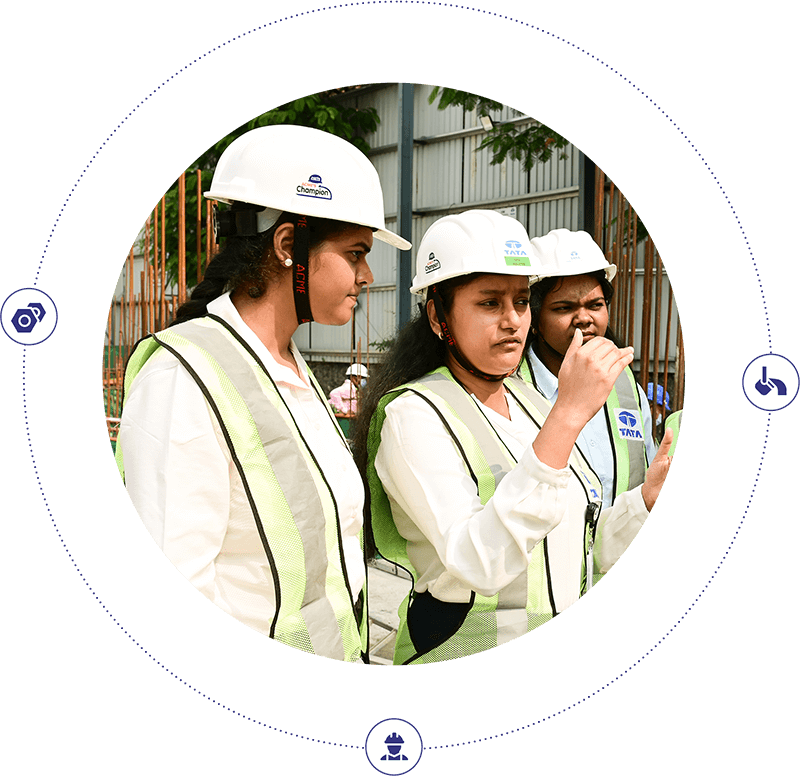
About TATA Projects Limited
Building New India
The Tata Legacy
We are a part of the Tata Group, which operates in more than 100 countries across six continents. Tata Group’s mission is ‘to improve the quality of life of the communities we serve globally, through long-term stakeholder value creation based on Leadership with Trust’.
Defining Tata Projects
In the dynamic landscape of sustainable technology, Tata Projects has emerged as India’s most distinguished Engineering, Procurement, and Construction (EPC) company. We leverage our collective expertise spanning diverse business sectors to drive impactful change within the industry and contribute significantly to nation-building. Driven by a shared vision, we champion the shift to clean energy, fuelling India’s journey towards achieving Net Zero ambitions. At Tata Projects, we build infrastructure and craft legacies that inspire future generations.
World-Class Solutions
We specialise in executing sustainable solutions for large and complex urban and industrial infrastructure projects. Our company provides comprehensive solutions that cover the entire life cycle of a project, from initial conceptualisation to operations and maintenance. We leverage innovative technology solutions to offer a range of services, including engineering, procurement, construction, commissioning, inspection and expediting, operations, repairs and maintenance, and shutdown services.
Our Pillars

Sustainability

State-of-the-art Technology

World-class Management

Industry Leadership

Diversity & Inclusion
Our Brand Philosophy
Simplify
At Tata Projects, simplifying our customers’ lives is at the core of our mission. Our strong engineering capability and domain expertise allow us to simplify even the most complex projects. We focus on delivering tailored solutions that precisely meet our customers’ needs, ensuring a seamless and hassle-free experience.
Create
We harness the power of technology, advanced construction methods, partnerships, and collaborative teamwork among diverse specialists to ensure the timely execution of every project. Our commitment to integrity ensures that all our solutions are crafted with the utmost quality and safety standards.
Serving Across the Value Chain

Concept

Design

Engineering

Lifecycle Services

Construction

Procurement
Growing Need for Sustainable Infrastructure
In the face of global climate change and the urgent call to decarbonise economies, nations must prioritise infrastructure solutions for future societies. As India progresses towards Net Zero carbon emissions, the next 25 years demand a reimagined approach to infrastructure development to enhance citizens’ quality of life amidst growing population, urbanisation, and demand.
India is committed to achieving Net Zero by 2070, with actionable targets for 2030. These include reducing carbon intensity by 45%, installing 50% renewable electric power, and reaching 500 GW of renewable energy capacity. As of April 2024, India has 192 GW of renewable capacity, comprising wind, solar, biomass, small hydro, waste-to-energy, and large hydro sources. The country added 17 GW of capacity in 2023, with over 13.5 GW being non-fossil additions.
Despite challenges, including a reliance on coal, India is making strides in energy transition. Renewable energy remains at the forefront, with 2024 expected to see the highest capacity additions, driven by falling module costs and tender backlog. Hybrid renewable tenders are on the rise, along with stand-alone storage tenders to balance variable generation. ‘Greening the Grid’ remains a primary focus, with efforts to enhance renewables central to India’s climate policy. Additionally, the Government’s PM Surya Ghar Muft Bijlee Yojana aims to provide free rooftop solar electricity to one crore households.
Green hydrogen is gaining traction, with projects expected to take off soon. Regulatory mandates in refining and fertiliser sectors are anticipated to drive domestic demand. India aims to produce 5 million tonnes of green hydrogen by 2030 and become a green hydrogen exporter using ammonia as the carrier molecule. Pilot projects are underway, with guidelines released for green hydrogen hub development.
Biofuels are also pivotal in India’s decarbonisation efforts, with ethanol blending rates in gasoline set to increase to 20% by Q4 FY2026. Compressed Biogas (CBG) production is being promoted, with plans for small to mid-size CBG plants across the country.
India is also preparing for a Carbon Credit Trading Scheme by 2026 to address emissions. The scheme aims to establish a platform for trading carbon credits, with a focus on hard-to-abate sectors such as steel, refineries, and petrochemicals. With these initiatives, India is poised to make significant strides towards its energy transition targets while tackling climate change.
Next 25 Years of Development
India has made impressive infrastructural progress over the past 25 years. With a focus on improving the ease of doing business, India has embarked on a journey towards creating a conducive environment for entrepreneurs and investors alike.
India is on the path to its next industrial revolution - Industry 4.0 - driven by the integration of advanced technologies such as the Internet of Things (IoT), Artificial Intelligence (AI), and automation. Multinationals are expanding capacity and establishing plants, making India a key export hub in global supply chains. This growth enables small industries to scale up, driving significant momentum in capital expenditure. This transformation enhances manufacturing efficiency and productivity, positioning India as a leader in industrial innovation and technology adoption.
To bolster India’s energy transition, the Government has introduced Production-Linked Incentive (PLI) schemes, accelerating private sector participation in manufacturing. For PV module manufacturing, Tranche 1 and Tranche 2 aim to build 65 GW annual capacity. PLI guidelines cover green hydrogen production and electrolyser manufacturing, with a budget of `13,050 Crore for green hydrogen and `4,440 Crore for electrolysers. The National Green Hydrogen Mission targets 5 MMT annual production by 2030, promoting employment and research. In EV manufacturing, FAME India Phase II supports hybrid / electric vehicles with a `10,000 Crore budget. PLI schemes for automobiles and auto components and advanced chemistry cells aim to boost domestic manufacturing. Additionally, India plans to launch a Carbon Credit Trading Scheme by 2026 to facilitate trading of carbon credits.
Looking towards India in 2047, the nation’s focus on carbon decarbonisation and technology will shape its sustainable future. Through extensive investment in renewable energy and technological innovation, India aims to significantly reduce carbon emissions. Advancements in clean energy technologies and electric mobility, supported by digital solutions like AI and IoT, will drive efficiency and sustainability across sectors. By integrating technology with environmental stewardship, India is poised to lead the way towards a greener and more prosperous future.
Tata Projects – Making a Difference
Tata Projects leads the construction and infrastructure sectors with a focus on innovation and safety. We employ advanced technologies like Building Information Modelling (BIM) and modular construction techniques to ensure high-quality, timely, and budget-friendly project delivery while prioritising sustainability.
We cultivate a culture of continuous learning, empowering our workforce to embrace emerging technologies. Our commitment to excellence aligns with the nation’s Net Zero goals, driving us to integrate clean energy solutions into our projects.
Inspired by innovation, safety, and sustainability, Tata Projects moves forward, shaping a future of excellence and environmental responsibility in construction and infrastructure.

